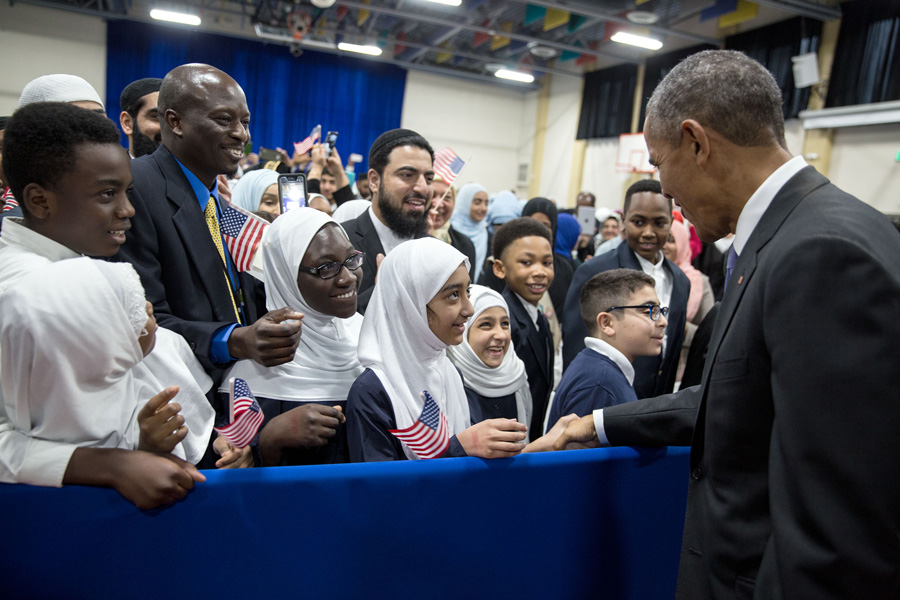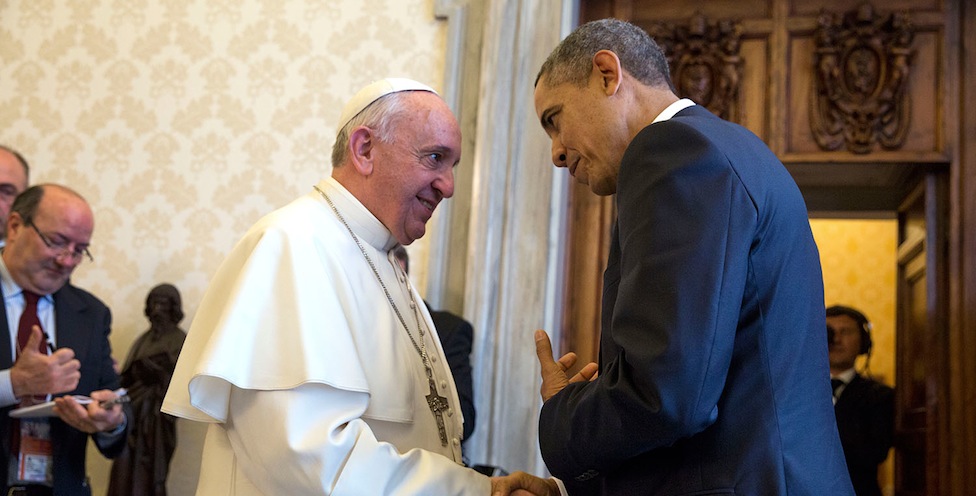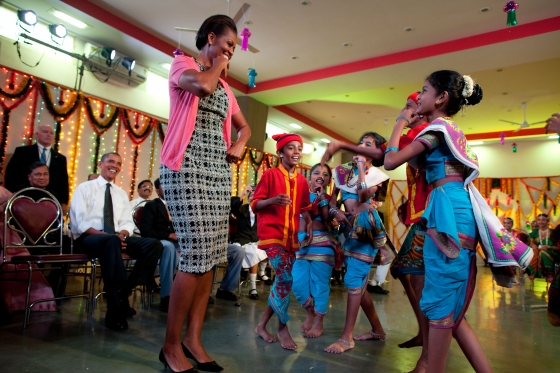

Over the past eight years, the White House Office of Faith-based and Neighborhood Partnerships (WHOFBNP) has worked with a wide range of community organizations to create greater opportunity for people across the country and around the world. During this time of thanksgiving, we are expressing our gratitude, reflecting on our work and looking toward the future.
Connections between the federal government and community organizations, both faith-based and secular, are critical to better serve those in need. Many Americans have ties to at least one faith or community organization, and when things get tough, people frequently turn to these organizations for help. Faith-based and community groups are often uniquely positioned to match people with the support, services, and protections they need. Sometimes these connections make the difference between prolonged struggle and a rapid return to stability.
Religious and community groups often apply for and receive federal funds to serve people in need. While the WHOFBNP plays no role in making these awards, we inform organizations about how to apply for government assistance if they are interested in doing so.

From the start, the Obama Administration has also understood that “partnerships” in this area is not limited to monetary awards and other financial assistance but can also involve other ways for governmental and non-governmental leaders to come together to tackle problems and create solutions. For example, we have worked with religious and community groups to ensure that families have information about and access to the free and nutritious meals their children can receive through USDA’s Summer Food Service Program. President Obama’s emphasis on the need to form non-financial as well as financial partnerships has opened doors for us to work with a wide variety of religious and community organizations and leaders.
A core function of the White House Office of Faith-based and Neighborhood Partnerships is to work through Centers for Faith-based and Neighborhood Partnerships across 12 federal agencies. Each Center works with faith and neighborhood organizations on specific challenges to transform communities and change lives. For example, we have worked with hundreds of jobs clubs to assist the unemployed and underemployed. We have helped prevent foreclosures and reduce family and chronic homelessness. We have co-hosted events with faith and community organizations to introduce entrepreneurs to federal resources that will help them start or grow their businesses. For more highlights of this work, click here.

During the Obama Administration, the capacity of federal agencies to work with religious and community groups, both at home and abroad, has significantly expanded. In 2013, the Department of State opened an Office of Religion and Global Affairs. Also, during the second term, the Peace Corps inaugurated a new initiative to partner with faith and community organizations, and EPA dedicated staff to forming partnerships with such groups for the first time.
In 2009, President Obama established the first-ever Advisory Council for Faith-based and Neighborhood Partnerships. The three Advisory Councils of the Obama Administration have brought together a diverse group of more than 60 distinguished leaders. For example, the Council has included representatives from the African Methodist Episcopal, Baha’i, Baptist, Buddhist, Catholic, Evangelical, Hindu, Jewish, Mainline Protestant, Mormon, Muslim, Native American, Orthodox Christian, Pentecostal and Sikh communities. Working together across beliefs and backgrounds, both religious and non-religious, Council members found common ground on a wide range of issues, including promoting fatherhood and healthy families, addressing poverty and inequality, tackling climate change, ending human trafficking, resolving certain church-state issues and promoting interfaith service and dialogue.
The Administration implemented many of the Council’s recommendations. For example, one of those recommendations prompted President Obama to establish the Interfaith and Community Service Campus Challenge in 2011, which has grown to include more than 500 educational institutions and individuals from across the country and more than 30 countries around the world. Also, in 2016, the Administration implemented Council-recommended reforms of some of the rules governing partnerships, adding new religious liberty protections for beneficiaries, while also adding new protections for the ability of religious providers to compete for government funds on the same basis as any other non-governmental organization.
We also have worked with the National Security Council (NSC) as well as other partners to promote religious freedom and other human rights around the globe. In 2013, NSC launched an unprecedented three-prong strategy to work with religious and other civil society leaders to protect these rights; resolve or mitigate conflict; and promote sustainable development. This initiative created a strong foundation for another highlight of our work: the visit of His Holiness Pope Francis to the White House in 2015. Long before the Pope arrived, President Obama instructed us to ensure that the visit would create lasting policy change based on some of the values these two leaders share. Accordingly, upon the Pope’s arrival, the Administration announced a series of new steps aimed at demonstrating solidarity with people in crisis, promoting sustainable development and protecting our common home. These steps included expanded collaborations with faith and community groups to combat climate change and the creation of a new position at the State Department to address the needs of religious minorities in the Middle East and in South and Central Asia.

Promoting religious pluralism at home has also been a hallmark of our work. In 2016, President Obama gave a speech at an American mosque, where he explained the link between protecting the rights of religious minorities at home and abroad. Also, in concert with faith, secular and civil rights leaders from across the country, the Administration acted to combat discrimination against people because of their faith or beliefs. And the President launched new traditions to recognize and celebrate the role of faith in our country, including Easter Prayer Breakfasts at the White House as well as celebrations of Diwali, Vesak, and Guru Nanak Dev Ji.
Working together, we have accomplished a lot in the past eight years. As we pause today to reflect on these accomplishments, however, we also are mindful of the work that remains to be done. We look forward to continuing to work with leaders of faith-based and community groups to serve people in need, create greater understanding and promote the common good.
Some Highlights
Working with faith and community groups, we have:
- Increased the number of summer meals served to kids by 16% between 2009 and 2015, a total of more than 1.2 billion summer meals served when school is out and food is scarce.
- Helped prevent foreclosure amidst the housing crisis by sharing information with more than 50,000 faith-based and community stakeholders regarding the Administration’s resources available for foreclosure, mortgage refinancing and scam prevention.
- Partnered with hundreds of job clubs to help the unemployed and underemployed.
- Co-hosted events with faith and community organizations to introduce entrepreneurs to federal resources that will help them start or grow their businesses.
- Deployed to help communities respond to and recover from disasters and provided training and shared expertise with thousands of diverse faith-based and community leaders on disaster recovery and protecting houses of worship.
- Worked with more than 1,500 congregations and with nonprofits and community groups to save money and prevent pollution through increased energy and water efficiency.
- Trained faith leaders and community partners on how to respond the needs of returning Veterans and their families.
- Helped expand the range of grantees and partners working in community-based re-entry programs, worked to prevent youth violence, and promoted responsible fatherhood initiatives.
- Improved student outcomes through the Together for Tomorrow program, which shares promising practices for educational achievement among schools, families, national service programs, and community-based organizations.
- Promoted adoption by extending and expanding the Adoption Tax Credit and by supporting the Child and Family Services Improvement and Innovation Act.
- Provided information to 12,000 faith, government and community leaders on how to identify and report the signs of human trafficking, and provided technical assistance to community organizations to help strengthen partnerships aimed at ending modern-day slavery.
- Worked with faith and community groups that were interested in spreading information about health benefits, including the ability to purchase quality, affordable health insurance on the Marketplaces established by the Affordable Care Act
- Advanced the My Brother’s Keeper and Let Girls Learn initiatives, which help all boys and girls to reach their full potential.
- Fostered integration and civic engagement with European Muslim and minority communities, promoted dialogue between Jewish and Muslim groups in the Middle East and in Europe, and battled against the rising tide of anti-Semitism.
- Worked to combat the spread of the Ebola, Zika and HIV viruses and to end preventable child and maternal deaths.
- Through Peace Corps volunteers, helped combat poverty, improve the health of women and children, and promote intercultural understanding.
To find out more about these accomplishments, read posts from the agency Centers for Faith-based and Neighborhood Partnerships:
• Department of Commerce: The Impact of Faith-Based and Neighborhood Partnerships
• Department of Education: Ensuring Every Student Succeeds and The President’s Interfaith and Community Service Campus Challenge Reflection
• Department of Health and Human Services: Positive Impact for our Communities
• Department of Housing and Urban Development: Partnering with Faith and Community Organizations to Strengthen Local Communities
• Department of Homeland Security: In Transition: A Retrospective DHS Center for Faith-based and Neighborhood Partnerships
• Department of Justice: Highlights of the DOJ Center for Faith-based and Neighborhood Partnerships
• Department of Labor: Our Thanks to All the Faith-Based and Community Partners that Came Together to Provide Job Opportunities for Countless Americans
• Department of Veterans Affairs: Empowering Veterans, building partnerships focus of VA’s Center for Faith-based and Neighborhood Partnerships
• Peace Corps: Partnering for Service: The Faith-Based Initiative at the Peace Corps
• State Department: Religion and Diplomacy: How It Matters to Foreign Policy Making
• Small Business Administration: The Importance of Entrepreneurship and the Faith Community Under the Obama Administration
• U.S. Department of Agriculture: A Reflection: Celebrating Eight Years of Faith-Based and Neighborhood Partnerships
Melissa Rogers serves as Special Assistant to the President and Executive Director of the White House Office of Faith-based and Neighborhood Partnerships.
Dana Mayber serves as Policy Advisor and Special Assistant for the White House Office of Faith-based and Neighborhood Partnerships.

